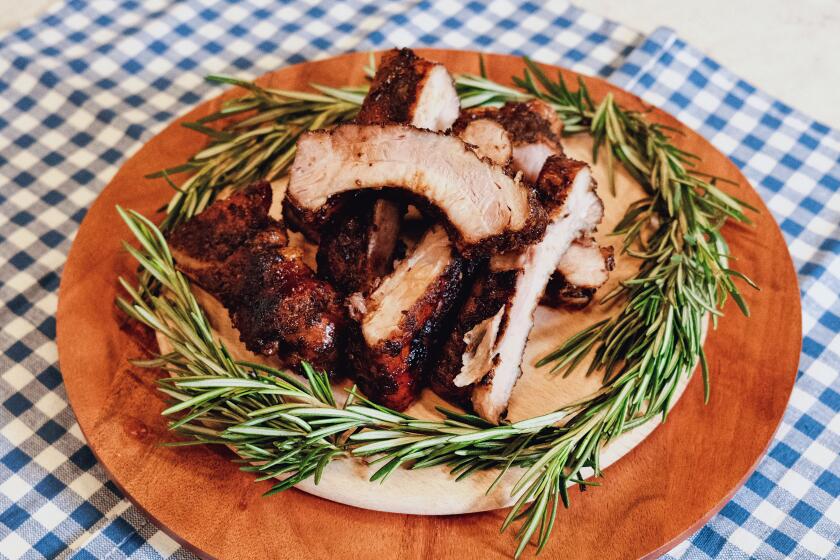Cheese Separates the Sheep <i> and</i> the Goats
- Share via
Goat’s and sheep’s milk cheeses, once considered exotic imported gourmet fare, have become staples among cheese lovers in Southern California. And with their increased popularity have come claims that they’re actually better for you than their cow’s milk competitors. Those claims are the subject of a lively debate among health professionals.
“They are [healthier], for several reasons,” says Jocelyne Eberstein, a doctor of Asian medicine who has an integrated alternative medical center in West Los Angeles.
According to Eberstein, dairy products from cows tend to have a lot of pesticides, hormones and antibodies. Goat products are healthier, she says, “because the animals themselves tend to be more healthy. They’re not raised like regular livestock, and because they graze on different plants, they bring in many more minerals to their products.”
Eberstein says goat cheeses also have smaller fat globules and that they increase intestinal flora, both of which makes them easier to digest.
Some practitioners, however, go further than Eberstein: They say that eating goat cheese actually improves some medical conditions. Goat cheese has been recommended as a treatment for problems as varied as heavy phlegm and eczema (scaling and itching of scalp and skin).
The problem, say nutritionists and allergists, is that there is little scientific data to back up many of these claims.
Granted, goat cheese--specifically the fresh varieties--is lower in fat with five to six grams of fat per ounce compared to eight to 10 grams per ounce for most cow’s milk cheeses. Feta cheese, which is usually made from sheep’s milk (although some is made with cow’s milk), is even lower.
But, say mainstream doctors and dietitians, that’s about the extent of the benefits.
“I don’t know of any significant medical benefit or advantage from eating sheep or goat milk products,” says Netty Levine, a registered dietitian who has worked at Cedar-Sinai Medical Center for 18 years. She acknowledges that both are excellent sources of calcium.
As far as milk is concerned, says Levine, “a cup of goat’s milk has 10 grams of fat, the same as whole cow’s milk. And low-fat goat’s milk is generally not available. So unless you have an allergy to cow’s milk or cow’s milk protein, there is no other medical benefit in drinking goat’s milk.”
Even that benefit, it turns out, may not always be true.
“It used to be thought that if you were allergic to cow’s milk, you wouldn’t be allergic to goat’s or sheep’s milk,” says Dr. Jonathan Corren, director of the UCLA Allergy Clinic. “Now we know that if you react to cow’s milk, there’s a good chance you’ll be allergic to the other milks as well. And, if you’re very allergic to cow’s milk, you probably shouldn’t drink goat’s milk unless it’s under the advice of an allergist who can actually do the testing.”
Many people cannot tolerate milk because of lactose intolerance, a deficiency in the enzyme necessary to break down lactose, the sugar found in milk. Because the lactose contents of goat and cow’s milk are similar, lactose intolerance is usually a problem with any kind of milk, unless it is lactose-free or low in lactose.
Any cultured cheese, however, is naturally lower in lactose, which is reduced during the cheese-making process. However, some cheeses are lower in lactose than others.
Laura Chenel, president and founder of Laura Chenel Chevreb in Sonoma, has been churning out goat cheese for 16 years. Although she doesn’t attribute any health benefits to her cheeses, she does stress that they’re virtually lactose-free.
“In our cheese-making process, practically all the lactose is consumed by the lactic acid bacteria we use to make the cheese,” Chenel says. “Therefore lactose intolerance is not an issue for our particular cheese.”
Laura Chenel Chevre makes soft cheese, 90% of it fresh, with a texture that is similar to that of cream cheese. Chenel also produces soft-ripening cheeses, specifically a Crottin and a Taupiniere, which have a white exterior rind similar to the rinds on Brie and Camembert.
At Westfield Farm in Massachusetts, Letty and Bob Kilmoyer produce a variety of goat cheeses. The softer fresh cheese is lower in fat (approximately five grams per ounce) because of its high moisture content. The aged cheeses, which have a lower moisture content, are higher in fat (six to eight grams per ounce).
Although this fat-moisture content ratio is true of all fresh cheeses compared to aged ones, the goat cheeses most commonly found in stores are the soft lower-fat fresh varieties, and their increased popularity is reflected in growing sales like those reported by Trader Joe’s.
According to Cara Yokomizo, senior buyer for Trader Joe’s, sales of goat and sheep cheeses were virtually nonexistent three or four years ago, but today they represent 10% of cheeses sold in the chain, up 35% to 40% from last year.
“I think the fat content is a major issue,” says Yokomizo. “Also, a lot of food magazines carry recipes that use these type of cheeses, and they’re also advertising.”
Letty Kilmoyer agrees with Yokomizo. “When we first started producing goat cheese in 1981, consumers were convinced that the only good goat cheese had to be imported. And secondly, there were few people willing to even taste it. They had automatic negative attitudes toward goats and goat cheese. Now there’s more visibility, people talk about it in cooking shows and cookbooks and the availability in so many different stores has introduced it to more and more of the public.”
That visibility, more than any health benefit, say Kilmoyer and Chenel, accounts for the growing popularity of goat’s and sheep’s milk cheeses.
“People just have to be willing to taste it, and then they realize it’s not awful at all,” says Kilmoyer. And although she knows some people who claim goat’s milk helps them if they have stomach problems, “it doesn’t mean that it cures anything.”
That is exactly what Corren tells patients who want to drink goat’s milk to cure eczema or heavy phlegm.
Still, people like singer Ron Gertz, for example, swear by the stuff. On the advice of his medical doctor, who is also a homeopath, he turned to goat cheese.
“I’m allergic to regular milk products,” says Gertz. “My sinuses get very clogged up and I get stomach aches. However, that does not happen when I eat goat cheese.”
Even Corren concedes that there are some benefits to be found. Feta cheese, for example, is certainly lower in fat but, it is higher in salt. “So it’s good for people on a low-cholesterol diet but very bad for people with high blood pressure or who need to keep their sodium low.
“One thing people can do if they have eczema and they think cow’s milk is a factor is take it out of their diets for two weeks. If there is an improvement, milk may be playing a role.”
As far as phlegm is concerned, “it is not an allergic reaction. However, some people swear that if they drink whole milk they develop phlegm and that it is thicker. Research has not borne this out.”
But, he adds, “some people can’t be convinced.”
More to Read
Eat your way across L.A.
Get our weekly Tasting Notes newsletter for reviews, news and more.
You may occasionally receive promotional content from the Los Angeles Times.










